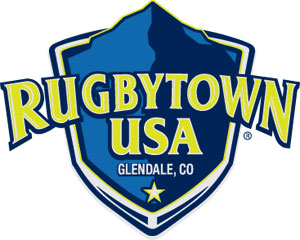
by Mark Smiley | Jun 23, 2017 | Glendale City News
by Kurt Woock
Writer for and on behalf of the City of Glendale
 At 1,727 square feet, the new video screen installed at Infinity Park earlier this summer covers an area the size of a three bedroom house. It’s more than twice the size of the previous video board. But the gains can be measured in more ways than sheer size.
At 1,727 square feet, the new video screen installed at Infinity Park earlier this summer covers an area the size of a three bedroom house. It’s more than twice the size of the previous video board. But the gains can be measured in more ways than sheer size.
“The city planned to replace the old video screen this year,” said Linda Cassaday, Glendale’s deputy city manager. The screen had reached the end of its projected lifetime. Screen technology has not only made significant advancements in the near decade that has elapsed since Infinity Park opened, but also the old technology is truly obsolete: Cassaday said it was becoming difficult, if not impossible, to find replacement parts.
Cassaday said the new screen, and the company that made it, needed to fit a few requirements. First, the screen needed to be versatile enough to accommodate the many needs at Infinity Park, which include showing live video from rugby matches, displaying statistics and advertisements, and broadcasting movies during Monday Movie Madness (the last of which wasn’t even on the city’s radar when the first screen was installed). Second, in order to conserve time and money, the video screen needed to be able to use the old screen’s existing platform. Third, the company providing the screen needed to be able to have a proven track record of being able to respond quickly to problems when they arise. After interviewing a few companies, Cassaday said the top choice was clearly Daktronics.
Daktronics is a South Dakota-based company that has been making electronic scoreboards, programmable display systems, and large screen video displays since 1968. Both the company headquarters and the manufacturing facility are in Brookings, South Dakota, which was an important factor for Cassaday. “When you have an issue, you want to reach out locally, especially when it comes to technica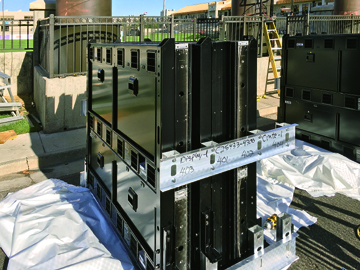 l problems,” she said. At one point, the video screen had an issue the day before a tournament. Needing a fix as soon as possible, the crew at Infinity Park was at the stadium at 1 a.m. in order to connect with the provider, which is located halfway around the world. With parts only one state away, addressing pressing issues quickly becomes much easier.
l problems,” she said. At one point, the video screen had an issue the day before a tournament. Needing a fix as soon as possible, the crew at Infinity Park was at the stadium at 1 a.m. in order to connect with the provider, which is located halfway around the world. With parts only one state away, addressing pressing issues quickly becomes much easier.
Chances are you’ve already seen a Daktronics product. Mile High Stadium, Coors Field, and Pepsi Center all use Daktronics video displays. In fact, nearly every major professional sports team in the country uses a Daktronics video screen in their home stadium, as do many college stadiums. Although this will be the first Daktronics installation at a rugby stadium in the U.S., Daktronics is no stranger to Rugby as Twickenham in London and the Adelaide Oval in Australia both use Daktronics screens.
Each board at Daktronics is custom made for the customer. The new screen at Infinity Park is the largest size that the current support system can handle. It measures 24 feet by 53 feet (the old board was 20 feet by 33 feet) and uses 13HD LED technology, the best currently available. “When you go to any sporting event and look up at the big screen, a lot of fans expect it to be as clear as their screen at home,” said Eric Cain, regional sales rep for Daktronics. “In the past, it was a bit more grainy. In the last seven years, we were able to get that clarity. That’s the goal: To make a live event realm be as good as or better than your living room.” In addition to the main video board, a new ribbon display will stretch 250 feet along the east end of the stadium.
All that new space will enhance the in-game experience for fans and will give advertisers more value for their sponsorship dollars. Instead of a static sign with a company logo printed on it, like the ones that surrounded the old video screen, the new video screen will be able to have moving logos, will be able to incorporate sponsors into in-game video, and can allow more sponsors to be featured in more interesting ways. “We can increase sponsorship opportunities because of it, recouping our cost that much more quickly,” Cassaday said. Companies can, for example, sponsor halftime or each time the home team scores. Cain said other stadiums have used the ribbon board to display statistics, freeing the main scoreboard for larger video and to engage with fans by displaying live social media feeds and conducting in-game fan polls.
The relationship between Daktronics and Infinity Park will not end when the installation is complete. Daktronics also provides software packages that display information on the screen and has in-state, full-time technicians, removing the need for Infinity Park to find contractors who are familiar enough with their video screen. Cain, who grew up in and lives in Colorado, is looking forward to a long tenure at Infinity Park. “I can’t express how pumped Daktronics is to be part of the first rugby stadium in the U.S.”

by Mark Smiley | May 26, 2017 | Glendale City News
by Kurt Woock
Writer for and on behalf of the City of Glendale
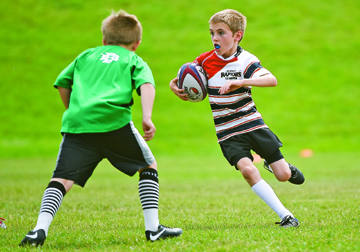
COMMERCE CITY, CO – JUNE 25: U10 Try Rugby Jamboree at Dick’s Sporting Goods Park in Commerce City, Colorado on June 25, 2016. (Photo by Seth McConnell)
Health is not simply the absence of physical ailments. To be healthy means to be in a state of wellness, and it is not limited to physical well-being. Like physical wellness, financial health is a state in which everyone strives to be. The similarities run deep. Financial well-being is the result of a variety of factors, one of which is the sum of each person’s lifestyle decisions. Good financial health is often the result of years of work and patience. Poor financial health can’t be fixed overnight: It requires long-term commitment. The importance of personal financial wellness has led Westerra Credit Union to make financial outreach and education a cornerstone of its day-to-day operations throughout the Denver community. So, Westerra Credit Union’s partnership with the Glendale Raptors Rugby Academy was a natural pairing.
The Glendale Raptors Rugby Academy and Westerra share a commitment to the children in the community. It’s in their DNA. The GRRA provides a place where kids as young as 5 can develop physical fitness, as well as develop qualities such as teamwork, communication, and hard work. Westerra Credit Union began when eight school teachers in Denver public schools decided to pool their savings and start a credit union in order to provide loans to fellow educators. (Today, nine area branches service members and more than $1.4 billion.)
Dana Russell, manager for PR and Marketing at Westerra Credit Union, said that the sponsorship met their mission of being an education and community based credit union, “Infinity Park and the Raptors are a huge piece of the community. It’s really something that kids can look forward to and be part of. It’s a way we can invest back in the community.” She said that in addition to the programs run out of Infinity Park, the Rugby in the Schools program, which sends out Raptors coaches to teach rugby basics at physical education classes throughout the Denver area, emphasize the commitment to bringing the benefits of rugby to everyone. West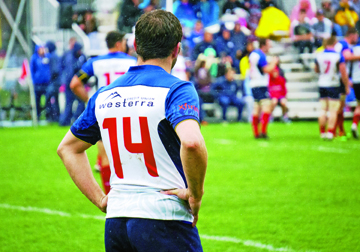 erra also goes into area classrooms in order to bring essential financial information to students.
erra also goes into area classrooms in order to bring essential financial information to students.
The basics of personal finance are not difficult concepts to understand, and the concepts do not change much over time: Once you know them, you know it for life. Nevertheless, a recent Gallup Poll showed that only a third of Americans use a budget to track monthly income and expenses, and about the same number have a long-term financial plan. To raise the level of financial literacy and action, Westerra makes it a point to teach these skills to students before they earn their first paycheck.
When Russell goes into a classroom, she makes the power of compound interest clear with a simple story: Person A invests $2,000 each year, beginning at age 22, and then stops contributing completely at age 30. Assuming an annual return of 9 percent, he or she will have roughly $580,000 at age 65. If Person B waits until they are 30 to begin investing, it will take 35 years of $2,000 annual contributions to reach only $470,000.
Russell then goes on to demonstrate how most high school students really can start saving and investing for their future. First, it means taking stock of what you’re able to earn, and what goals you have. By laying out future expenses ahead of time, you’re able to build a budget. Russell said that a budget is a reflection of what you value and the decisions you make. Sometimes it involves a tradeoff: a nice car in exchange for a smaller apartment, or an apartment downtown and the decision to bike and use public transit. Westerra has online resources for students and parents to use to begin budgeting, tracking bank accounts, using a debit card responsibly, and more.
Back in the classroom, Russell explains how a credit score is similar to a report card: It’s a statement about your prior work. You can improve a poor score through diligence, and you can lose a good score by being careless. It’s a simple but long-term job to maintain a good credit score, and Russell’s classroom presentations are just an introduction. Parents play a crucial role in a child’s ongoing financial education. Russell said that parents are often hesitant to share details about family finances, particularly stumbles they might have had. It seems too personal, or like it demands a veil of privacy. But these are ideal times to share. If you’re going on a vacation, explain the various costs and how planning ahead makes splurges like a vacation possible. Parents should consider involving their children in the decision-making process of various trade-off scenarios (i.e. should we go out to dinner as a family and play games at home, or should we eat dinner at home and then go out to the movies?).
Russell said a fun exercise for parents is asking kids how much they think things cost and then revealing the true cost. Having these conversations can lay the foundation for decisions down the road, such as paying for a college education. Russell added that building a healthy mindset toward money is less about how much money a person has, and more about an understanding of what a person is responsible for and how choices they make affect their lives. Those are skills whose benefits extend far beyond money management.
Raising healthy kids takes a village. Westerra and the Raptors are making sure that the village is ready for that challenge by offering programs that encourage healthy lifestyles.

by Mark Smiley | Apr 28, 2017 | Glendale City News
by Marco Cummings
Writer for and on behalf of the City of Glendale
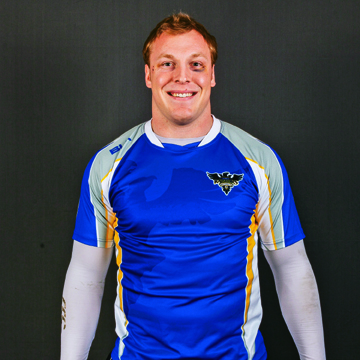 The sport of Rugby shares a common DNA with American Football, dating back to the late 1800s when both sports added the aspect of carrying the ball in hand to the laws of the game, branching both sports off from their common ancestor: association football (the sport now known as soccer in the United States).
The sport of Rugby shares a common DNA with American Football, dating back to the late 1800s when both sports added the aspect of carrying the ball in hand to the laws of the game, branching both sports off from their common ancestor: association football (the sport now known as soccer in the United States).
In the U.S., participants in the two sports often try their hand at both, and one need not look far outside of Glendale to find prime examples. Glendale Mayor Mike Dunafon tried his hand in the NFL with the Denver Broncos in the mid-1970s before becoming enamored with rugby in the British Virgin Islands. Current Glendale Raptors captain Zach Fenoglio played both rugby and football at Regis Jesuit High School in Aurora before moving on to coach both at his alma mater.
The newest addition to the Glendale Raptors’ roster has been forged in a similar mold. Raptors second-row man Ben Landry joins Glendale after a year of pursuing a dream to play in the NFL. The former Seattle Saracens and USA Rugby player earned an invite to a Seattle Seahawks minicamp as both he and the team looked to determine whether his rugby skill set would translate to the biggest stage in American football.
Physically, it was an easy transition to make for the 6-foot-6, 270-pound Landry, who featured at tight-end in the American game.
“As far as running routes and blocking, that was just athleticism that I do every week playing rugby,” Landry explained. “That wasn’t a big change for me at all.”
He also had the benefit of a ringing endorsement from one of the biggest names in the NFL, his longtime friend and former high school teammate, J.J. Watt of the Houston Texans.
“Ben is such a hard worker, and he’s extremely, extremely mentally tough,” Watt said in an interview with ESPN, adding, “He’s a brute force kind of guy.”
Work hard is what Landry did, but he faced numerous challenges along the way in pursuit of his NFL dream.
“The biggest challenge was basic football I.Q.,” Landry explained. “Learning the playbook and stuff like that. You watch NFL on T.V. and you really don’t see how intricate all the play calling and all the audibles at the line are until you get in that situation.”
In the end, his year-long journey didn’t pay off with a much-coveted NFL contract. But he did reap the rewards of the intense NFL training he underwent during that period.
“I’d have to say the physicality is an interesting take,” said Landry. “When I trained for the NFL I really trained for strength, speed, and acceleration. In rugby, you train for aerobic capacity and conditioning. As I’m sitting right now, I’m bigger, faster and stronger than I’ve ever been in my entire life and I’d have to contribute that to a year of trying to prep for the NFL.”
In Glendale, Landry has been reunited with his first love and passion in sport. A rugby player since the age of seven, the Pewaukee, Wis., native was first introduced to the game by his father and uncle, who both played for Milwaukee Rugby Club back home.
“For me it’s always been football in the fall, basketball in the winter and rugby in the spring,” he said. “Rugby is my first passion. [The NFL] was an awesome experience, but going in to that, I put a timeline on that opportunity. I said, I’m going to devote a year to this to give it an actual shot, a solid go, a good effort. If nothing accumulates, then I’m going to head back to rugby. That was always kind of my plan.”
In Glendale, he’s been reunited with a sport he loves but also a familiar head coach in Glendale’s David Williams. The pair developed a rapport while both part of the USA Eagles and members of Denver’s PRO Rugby team, the Denver Stampede, during its inaugural season last year.
“He’s your head strength coach, he’s your head skills coach and the head coach during trainings at night,” Landry said of Williams. “So, you really work with one man and his all-encompassing idea of the entire program. One guy being able to do it all really builds a team atmosphere.”
Williams has likewise welcomed Landry as an important addition to the Raptors.
“The team and I are only too happy he chose to come back to Denver,” said Williams. “Lando brings a lot to the daily training environment with his training attitude and just being a top bloke that strives to be the best he can be. He has gotten straight back into rugby training and analysis, which is a testament to owning his role within the team and doing his job.”
While Landry’s long-term goal is to make it back into the mix in the USA Eagles player selection pool, his job with the Raptors maintains a singular focus: bringing a Major Rugby Championship to Glendale.
“We’re finishing up this season and we have a championship game in June that we’re planning on playing in, and we’d love to win.”

by Mark Smiley | Mar 24, 2017 | Glendale City News
by Kurt Woock
Writer for and on behalf of the City of Glendale
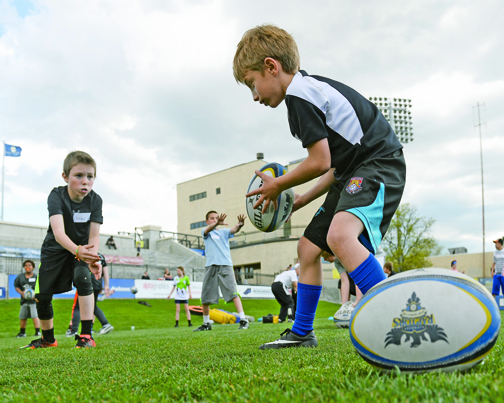
GLENDALE, CO – MAY 18: Rugby Skills Clinic at Infinity Park in Glendale, Colorado on May 18, 2016. (Photo by Seth McConnell)
The Glendale Raptors has emphasized youth programs since its founding. Programs offered through the Glendale Raptors Rugby Academy are a good way to bring the sport to a new audience as young players learn rugby skills and rules through games, drills, and scrimmages. Youth programs are also a way to foster health, independence, and confidence. Trained coaches create a positive environment where children can learn to play safely while they learn to love one of the fastest growing sports in the United States.
Last year, the Glendale Raptors Rugby Academy tried something new. They developed and ran a one-day clinic during which young athletes spent an entire day honing a particular skill — tackling. The tackling clinic allowed young athletes to dive in deep, working with Raptors players and coaches, to learn how to tackle safely and more effectively. The clinic was popular not only with rugby players, but also with youth who play football. Rugby tackling skills have been embraced by the Seattle Seahawks, among other types of athletes, including kick boxers, soccer players, and cross country runners. Responding to the demand for more programming like that, the Academy has developed a lineup of specialty clinics, six in total, to offer this spring.
This year’s clinics began on March 8 and run through May 25. Every other Wednesday evening, a different skill is taught. The particular skills that will be taught include: tackling; catching, passing, and decision making; running support lines and assessing options during gameplay; kicking; effective backline play; and forward play, scrums, and line-outs. Jenna Anderson has worked with youth programming at Infinity Park since 2008 and is currently program director. She said the programs are designed for all skill levels. The amount of individual skill building exercises and small group drills allows a range of skill levels to train at once. In fact, one of the clinic’s biggest selling points is the high level of coaching that young athletes receive on an individual basis. David Williams coaches the Raptors men’s elite team, and he’ll be there. So, too, will be Mark Bullock, the Raptors’ longtime director of rugby and a pillar of rugby in the U.S. Multiple Raptors players, who must gain certification to coach, will also be on hand.
For rugby players, these clinics are a no-brainer. Any sport requires repetition to gain proficiency. Training under the direction of some of the top rugby coaches in the country is a proposition few other youth sports can offer. That immediate, high-level personal feedback allows young athletes to quickly raise their games. Ideally, a young athlete would attend all six of the clinics at Infinity Park. Even if a skill is outside of a young rugby player’s traditional position, broadening one’s complete skill set is important, especially at a young age. As Anderson points out, it is “good to have more tools in your toolbox.”
Attending these clinics is also a boon to athletes in other sports. Anderson said that middle school and junior high are key times to introduce students to the value of developing skills in multiple sports. She said there is a trend of students who attempt to “specialize” in a sport sooner than they should. At a young age, becoming a well-rounded athlete will pay higher dividends in the long run than specializing early, a fact that applies to any sport, not just rugby. Although it might seem logical to assume that a student who devotes 20 hours a week to a particular sport will have a leg up over another student who devotes 10 hours to two different sports, the opposite is actually more likely: Avoiding specializing too early actually increases the likelihood for success in the sport a student might eventually end up specializing in.
Students who develop skills in more than one sport don’t separate the things they learn in each into silos. Instead, the mental and physical skills they pick up in one sport can be applied to all the others. Think of it as cross-pollinating. A football player might become a stronger tackler after learning about tackling in the rugby tradition. A basketball player’s sense of court awareness could develop more deeply after learning how rugby players attack and defend. The possibilities are endless. Anderson said that football players might have obvious interest in the clinics, particularly the tackling and kicking clinics, but she has seen plenty of athletes whose primary sport doesn’t have a clear connection to rugby but who nevertheless attend, broaden their larger sense of athleticism, and have fun while doing it.
Clinics cost $20 per session and each clinic takes place from 5 to 6:30 p.m. on Wednesday nights at Infinity Park. Anderson said the clinics are a great lead-in for the Try League Rugby, also offered by the Glendale Raptors Rugby Academy. In this league, players can apply skills they developed at the clinics while playing 7-a-side, or Olympic-style, rugby. Players 5 years and older can sign up for Try League, which begins at the end of April.

by Mark Smiley | Mar 1, 2017 | Glendale City News
by Kurt Woock
Writer for and on behalf of the City of Glendale
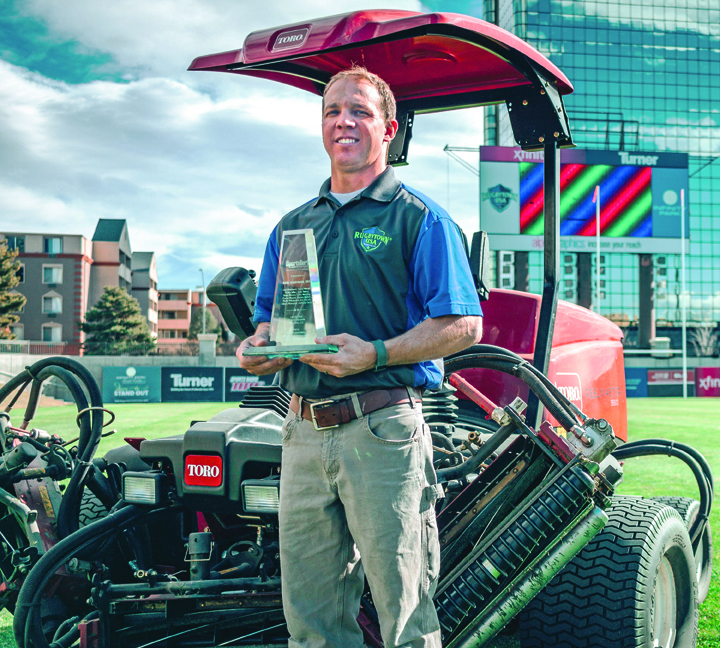 Imagine working all week to make something, only to have someone tear it apart. Now, imagine that happening over and over. That might sound like a punishment suffered by a poor sap from Greek mythology, but Noel Harryman calls it his job. And he likes it. Harryman is the manager for turf operations and Infinity Park. He leads a team from Glendale Public Works who ensure that the more than 10,000 square meters of Kentucky bluegrass at Infinity Park are green, neat, trimmed, and ready to take a beating.
Imagine working all week to make something, only to have someone tear it apart. Now, imagine that happening over and over. That might sound like a punishment suffered by a poor sap from Greek mythology, but Noel Harryman calls it his job. And he likes it. Harryman is the manager for turf operations and Infinity Park. He leads a team from Glendale Public Works who ensure that the more than 10,000 square meters of Kentucky bluegrass at Infinity Park are green, neat, trimmed, and ready to take a beating.
Infinity Park’s rugby pitch is designed to be flexible. It can host private events, it becomes movie theater seating in the summers. But Harryman said his job has one clear central purpose, “My job is to make sure it’s ready for play.” To do that, Harryman combines chemistry, hydrology, botany, and a big dose of sweat equity. And he does it well; Infinity Park won the 2016 Sports Turf Managers Association award for best sporting grounds in the country.
Anyone familiar with the Sisyphean task that is caring f or a lawn knows that the straightforward tasks involved — fertilizing, watering, cutting, weeding — bely a much more complex operation. Having a lush, green lawn is a fixed goal, but the obstacles that stand in the way are, like a game of whack-a-mole, ever changing. Weeds one year, bugs the next. A few months of drought followed by a week of heavy rain. Every year is different. Unlike a homeowner’s yard, however, Harry-man’s proficiency is judged by thousands every week.
or a lawn knows that the straightforward tasks involved — fertilizing, watering, cutting, weeding — bely a much more complex operation. Having a lush, green lawn is a fixed goal, but the obstacles that stand in the way are, like a game of whack-a-mole, ever changing. Weeds one year, bugs the next. A few months of drought followed by a week of heavy rain. Every year is different. Unlike a homeowner’s yard, however, Harry-man’s proficiency is judged by thousands every week.
During the season, Harryman is on the field daily. A week before a game, Harryman and a few others walk every inch of the field. They bring with them a mixture of pre-germinated grass seed, fertilizer, and sand. They look for patches that are wearing thin and apply the pasty mix. The mixture takes hold quickly and will yield grass in a matter of a few weeks. Monday, they give the entire field a full mow and another check for spots that need attention. Depending on the time of year, Monday’s mow might be followed by an application of fertilizer. Tuesday is a practice day, so field maintenance is low, but Harryman must check the field after for any damage done during practice. Wednesday brings another mow.
Thursday the field is prepped for painting. Friday is another mow followed by painting the field, a task that takes three people a full day. Saturday (game day) begins with another spot check for anything abnormal. On a good day, this might be a quick task. But a surprise snowstorm might necessitate an all-hands-on-deck snow removal (something that happened multiple times last year). After the game, the crew fills divots, and mixes a new batch of pre-germinated grass seed, and the cycle begins anew.
A few differences between home lawn care and rugby lawn care emerge. First, there’s a lot of mowing. Three mowings a week keep the lawn uniform. Harryman said that a standard home lawn has a height of 2.5 to 3 inches while Infinity Park’s field is a trim 1.25 inches. The shorter height provides a better playing surface for players and can increase the density of the grass over time.
Harryman also waters the turf using a method more precise than a sprinkler on an automatic timer. He calculates the field’s precise water needs based on temperature, soil measurements, and other variables. He aims to have the soil about 80-percent saturated with water, enough to ensure the plant receives the water it needs while leaving enough absorption potential in the event of rain (or snow). “One of the worst things you can do is play on a wet field,” he said.
Another benefit to not fully saturating the field is to encourage individual grass roots to drive down deeper, which makes the entire field stronger and more resilient. Harryman said that calculating the grass’s needs before watering results in less water usage relative to most home lawns.
Harryman also conducts semi-annual long-term maintenance. Three to four times per year, he takes soil samples to determine levels of various nutrients. After each test, he concocts a custom fertilizer that will bring the soil up to optimal nutrient levels. In one year, the field receives about 40 fertilizer applications, which switch between liquid and pellet. Each spring and fall, the entire field is “bulk seeded,” as opposed to the spot-fills that take place during the season, which ensures a thick turf.
The grass on a sporting field is often overlooked unless it’s in bad shape. But, like the underwater portion of an iceberg, it is crucial to supporting something that everyone can see and appreciate — the game itself. Even if the lawn doesn’t receive cheers from the crowd, the team that works on the grass knows that they’ve played an integral part in making the Infinity Park experience possible.
Joshua Bertrand, the director of public works for Glendale, said that the field represents something symbolic in addition to performing its functional role. “If fans rush the court at a college game, the NCAA fines them,” he said. “In high school, schools can get in trouble for the same thing.” YouTube is filled with videos of NFL security crews tackling fans who step foot onto the grass. “But at Infinity Park, fans and family are all invited onto the field. This happens after every game. It’s an accessible resource. It’s a unique part about Infinity Park. Most stadiums don’t have that.”

by Mark Smiley | Jan 30, 2017 | Glendale City News
by John Arthur
Writer for and on behalf of the City of Glendale
Since the club’s founding more than a decade ago, the Glendale Raptors have been a pillar of community involvement, most notably through their extensive involvement with Glendale youth. Raptors team members and coaches spend time volunteering at Children’s Hospital every year, offer free and low-cost youth rugby clinics and programs, as well as a Rugby Academy where local youth can build rugby skills from kindergarten all the way to the professional level. The Raptors’ commitment to involvement with Glendale is an especially important aspect of the club’s overall mission, and not simply because it engages young people with positive mentors and promotes fun and fitness. Youth rugby programs have the added benefit of increasing awareness for the fastest growing sport in the United States, creating a new generation of players, coaches, and fans.
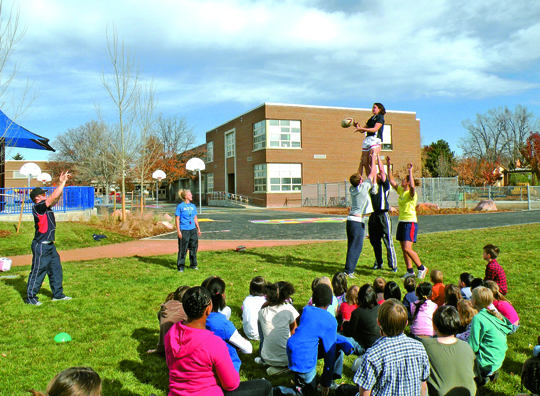 One of the most successful youth programs in 2016 was Rugby in the Schools, an offering spearheaded by Raptors Youth Programs Coordinator Jenna Anderson. Rugby in the Schools introduces the game through Rookie Rugby, a non-contact, educational format, specifically designed for presentations and instruction in school PE classes. Playing games and running drills, Anderson, alongside Raptors players and staff, introduces local schools to rugby’s inclusive nature, ensuring every child participates for the entire program period. Because rugby is often unfamiliar to local youth, everyone starts on an even playing field; as Anderson puts it: “We go in and it’s a clean slate. Everyone participates. Everyone is interested and every single child plays. Learning something new, as a group, is really important and really special.” Students experience the fun and excitement of rugby, as well as the importance of inclusion and good sportsmanship.
One of the most successful youth programs in 2016 was Rugby in the Schools, an offering spearheaded by Raptors Youth Programs Coordinator Jenna Anderson. Rugby in the Schools introduces the game through Rookie Rugby, a non-contact, educational format, specifically designed for presentations and instruction in school PE classes. Playing games and running drills, Anderson, alongside Raptors players and staff, introduces local schools to rugby’s inclusive nature, ensuring every child participates for the entire program period. Because rugby is often unfamiliar to local youth, everyone starts on an even playing field; as Anderson puts it: “We go in and it’s a clean slate. Everyone participates. Everyone is interested and every single child plays. Learning something new, as a group, is really important and really special.” Students experience the fun and excitement of rugby, as well as the importance of inclusion and good sportsmanship.
Anderson has led youth programming for the nine years since being brought into the Raptors club in 2008, but notes that 2016 was an especially busy year. The Raptors worked with 16 different local schools, and also held eight separate sessions elsewhere, including clinics at Glendale’s Infinity Park and for local nonprofits, as well as field days at local summer camps. According to Anderson, “2016 has really taken off. Teachers have shown a lot of interest in having rugby as part of their curriculum.” In addition to the host of benefits Rookie Rugby offers participating schools and students, the programming is and always has been entirely free of charge.
Rugby in the Schools is focused on communities surrounding Glendale, although dem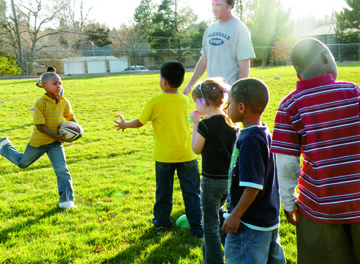 and exists all along the Front Range. In 2016, Anderson and the Raptors were a presence across metropolitan Denver, in both public and private institutions, though she admits the popularity of Rugby in the Schools has forced her to turn down requests from institutions located outside of the metro area. Working in physical education classrooms from kindergarten through 8th grade, she and players from the Raptors Men’s, Women’s, and Under-20 teams interacted with as many as 500 students per school. Engaging every interested student at each school, Anderson and her assistant volunteers spent between one and four days per location completing programming.
and exists all along the Front Range. In 2016, Anderson and the Raptors were a presence across metropolitan Denver, in both public and private institutions, though she admits the popularity of Rugby in the Schools has forced her to turn down requests from institutions located outside of the metro area. Working in physical education classrooms from kindergarten through 8th grade, she and players from the Raptors Men’s, Women’s, and Under-20 teams interacted with as many as 500 students per school. Engaging every interested student at each school, Anderson and her assistant volunteers spent between one and four days per location completing programming.
It’s difficult to point to any one reason why Raptors youth rugby programs blossomed in 2016. Clearly there are significant benefits for both the young participants and the schools they attend, but there is also something more. Rugby’s meteoric rise in popularity stateside in the last several years has been incredible, with Glendale at the epicenter of the sport in the United States. The reemergence of rugby in the 2016 Olympic games, combined with the Raptors’ successes on and off the pitch, have played a role as well. What is clear is that rugby is, in Glendale and the rest of the country, a sport that’s here to stay — and one that players and fans of all ages take great pride in.
Asked about her favorite part of Rugby in the Schools, Anderson says, “I love going and seeing kids who already play for the Raptors. They know we’re coming and they wear their Raptors shirts and it’s obvious that they’re really proud to be rugby players. It’s wonderful to see kids passionate about the sport.” The growth of rugby’s popularity in the United States shows no signs of slowing, and the work that Anderson and the Raptors are doing in community classrooms demonstrates that the next generation of players and fans is here to stay as well.

 At 1,727 square feet, the new video screen installed at Infinity Park earlier this summer covers an area the size of a three bedroom house. It’s more than twice the size of the previous video board. But the gains can be measured in more ways than sheer size.
At 1,727 square feet, the new video screen installed at Infinity Park earlier this summer covers an area the size of a three bedroom house. It’s more than twice the size of the previous video board. But the gains can be measured in more ways than sheer size. l problems,” she said. At one point, the video screen had an issue the day before a tournament. Needing a fix as soon as possible, the crew at Infinity Park was at the stadium at 1 a.m. in order to connect with the provider, which is located halfway around the world. With parts only one state away, addressing pressing issues quickly becomes much easier.
l problems,” she said. At one point, the video screen had an issue the day before a tournament. Needing a fix as soon as possible, the crew at Infinity Park was at the stadium at 1 a.m. in order to connect with the provider, which is located halfway around the world. With parts only one state away, addressing pressing issues quickly becomes much easier.







